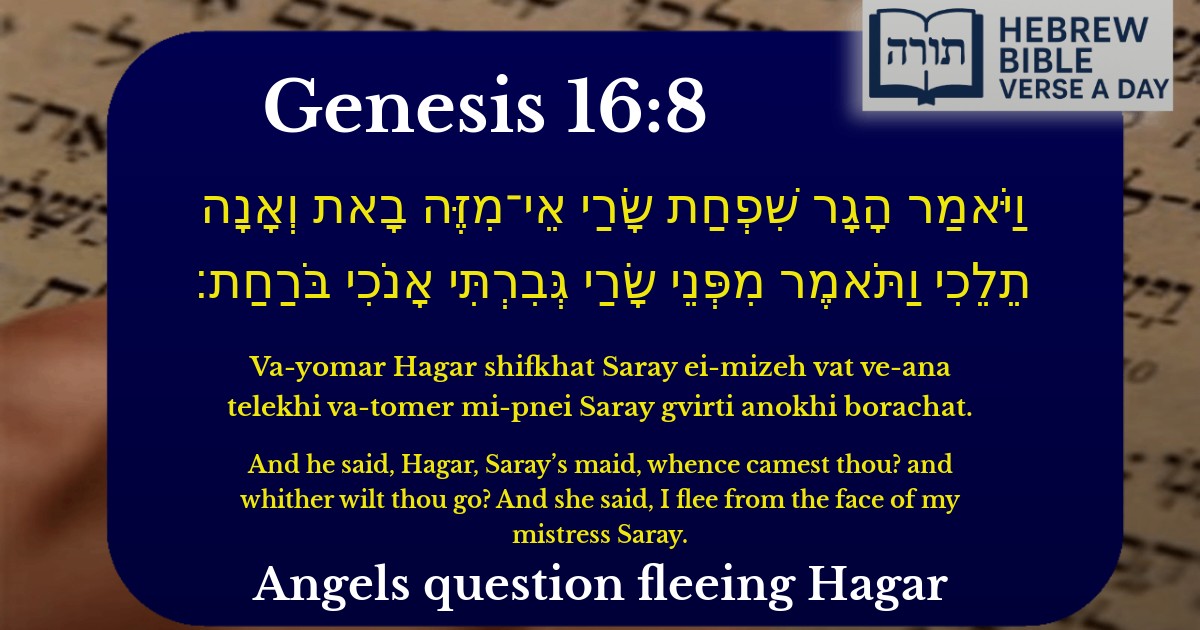Join Our Newsletter To Be Informed When New Videos Are Posted
Join the thousands of fellow Studends who rely on our videos to learn how to read the bible in Hebrew for free!
Hebrew Text
וַיֹּאמַר הָגָר שִׁפְחַת שָׂרַי אֵי־מִזֶּה בָאת וְאָנָה תֵלֵכִי וַתֹּאמֶר מִפְּנֵי שָׂרַי גְּבִרְתִּי אָנֹכִי בֹּרַחַת׃
English Translation
And he said, Hagar, Saray’s maid, whence camest thou? and whither wilt thou go? And she said, I flee from the face of my mistress Saray.
Transliteration
Va-yomar Hagar shifkhat Saray ei-mizeh vat ve-ana telekhi va-tomer mi-pnei Saray gvirti anokhi borachat.
Hebrew Leining Text
וַיֹּאמַ֗ר הָגָ֞ר שִׁפְחַ֥ת שָׂרַ֛י אֵֽי־מִזֶּ֥ה בָ֖את וְאָ֣נָה תֵלֵ֑כִי וַתֹּ֕אמֶר מִפְּנֵי֙ שָׂרַ֣י גְּבִרְתִּ֔י אָנֹכִ֖י בֹּרַֽחַת׃
וַיֹּאמַ֗ר הָגָ֞ר שִׁפְחַ֥ת שָׂרַ֛י אֵֽי־מִזֶּ֥ה בָ֖את וְאָ֣נָה תֵלֵ֑כִי וַתֹּ֕אמֶר מִפְּנֵי֙ שָׂרַ֣י גְּבִרְתִּ֔י אָנֹכִ֖י בֹּרַֽחַת׃
🎵 Listen to leining
Parasha Commentary
📚 Talmud Citations
This verse is not quoted in the Talmud.


Context of the Verse
The verse (Bereshit 16:8) describes the encounter between Hagar, Sarai's maidservant, and an angel of Hashem after she fled from her mistress. This occurs following Sarai's suggestion that Avram have a child with Hagar, leading to tension between the two women.
Rashi's Commentary
Rashi explains that the angel's question, "whence camest thou?" was rhetorical—meant to engage Hagar in conversation rather than seek information. The angel knew she was fleeing from Sarai but wanted her to reflect on her actions. Rashi notes that the angel addressed her as "Hagar, Sarai's maid" to remind her of her proper place as a servant, implying she should return and submit to her mistress (Rashi on Bereshit 16:8).
Midrashic Insights
Rambam's Perspective
Rambam (Hilchos Avadim 9:8) derives from this episode that a servant must honor their master or mistress, and fleeing from proper authority is improper. Hagar's flight, though understandable, was not justified, as she had been elevated from servitude yet failed to show proper deference.
Moral Lessons